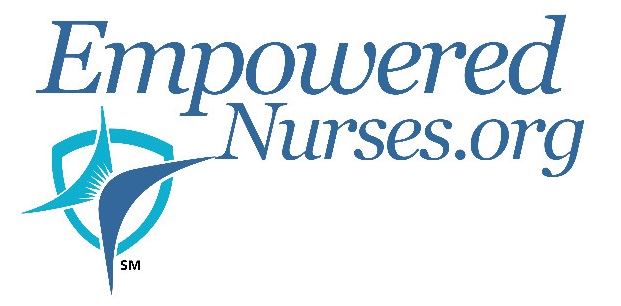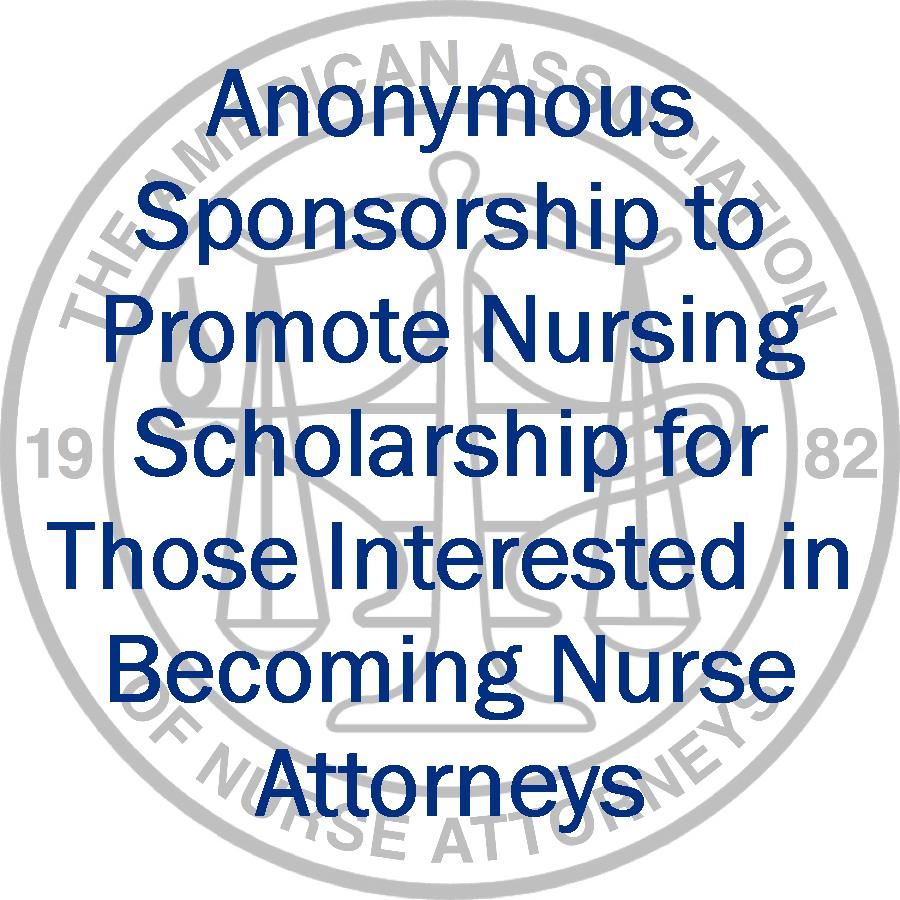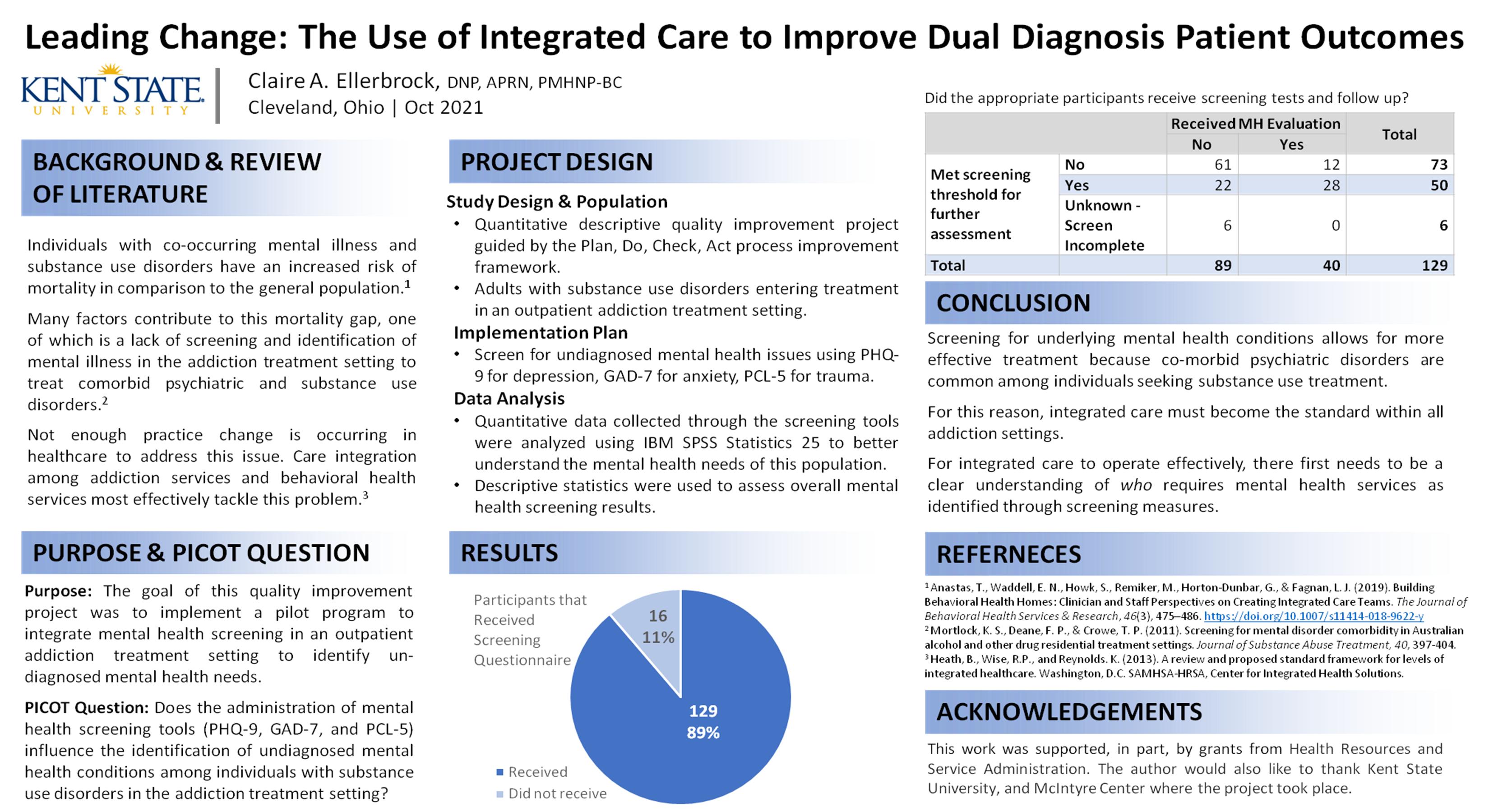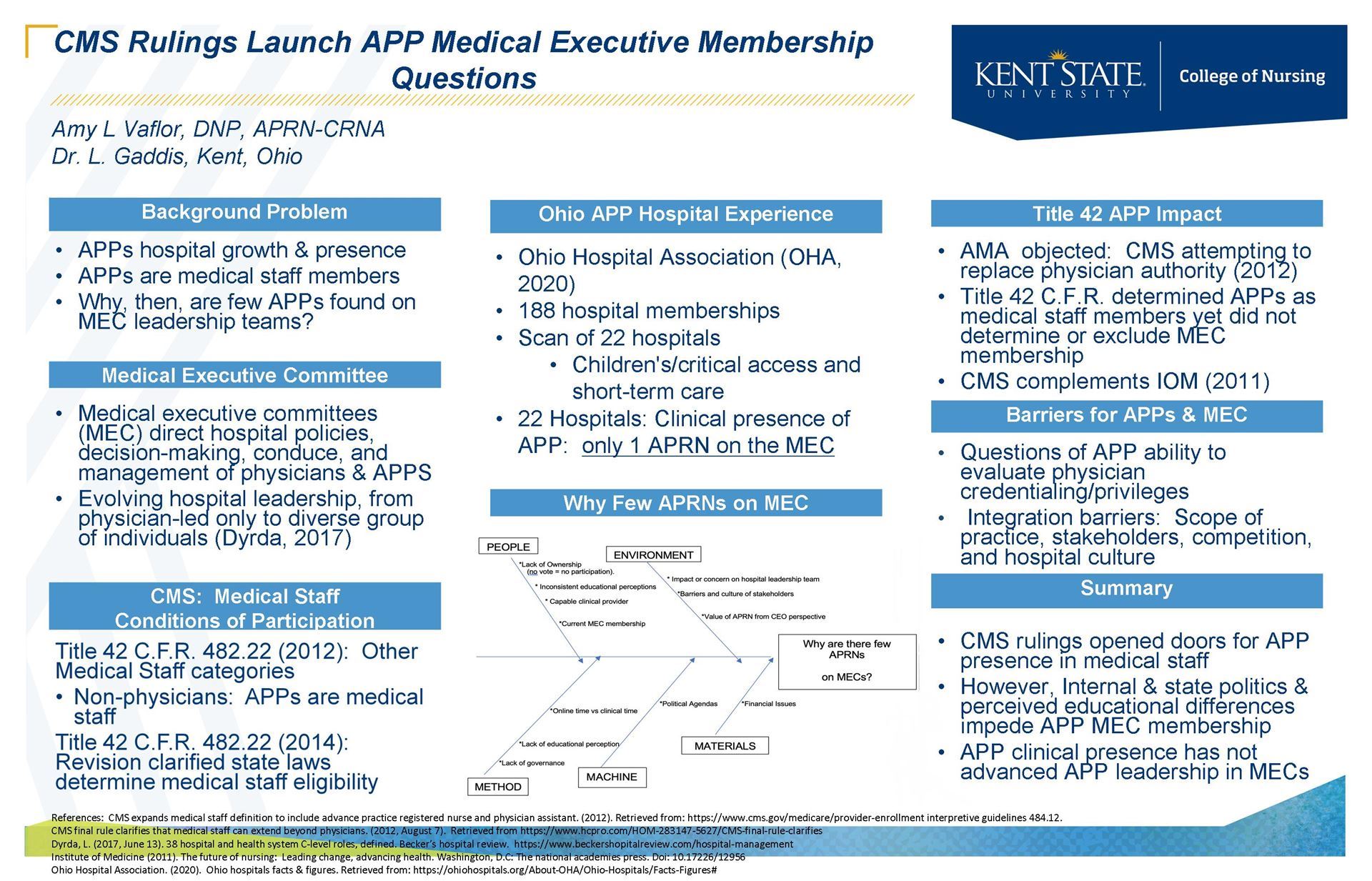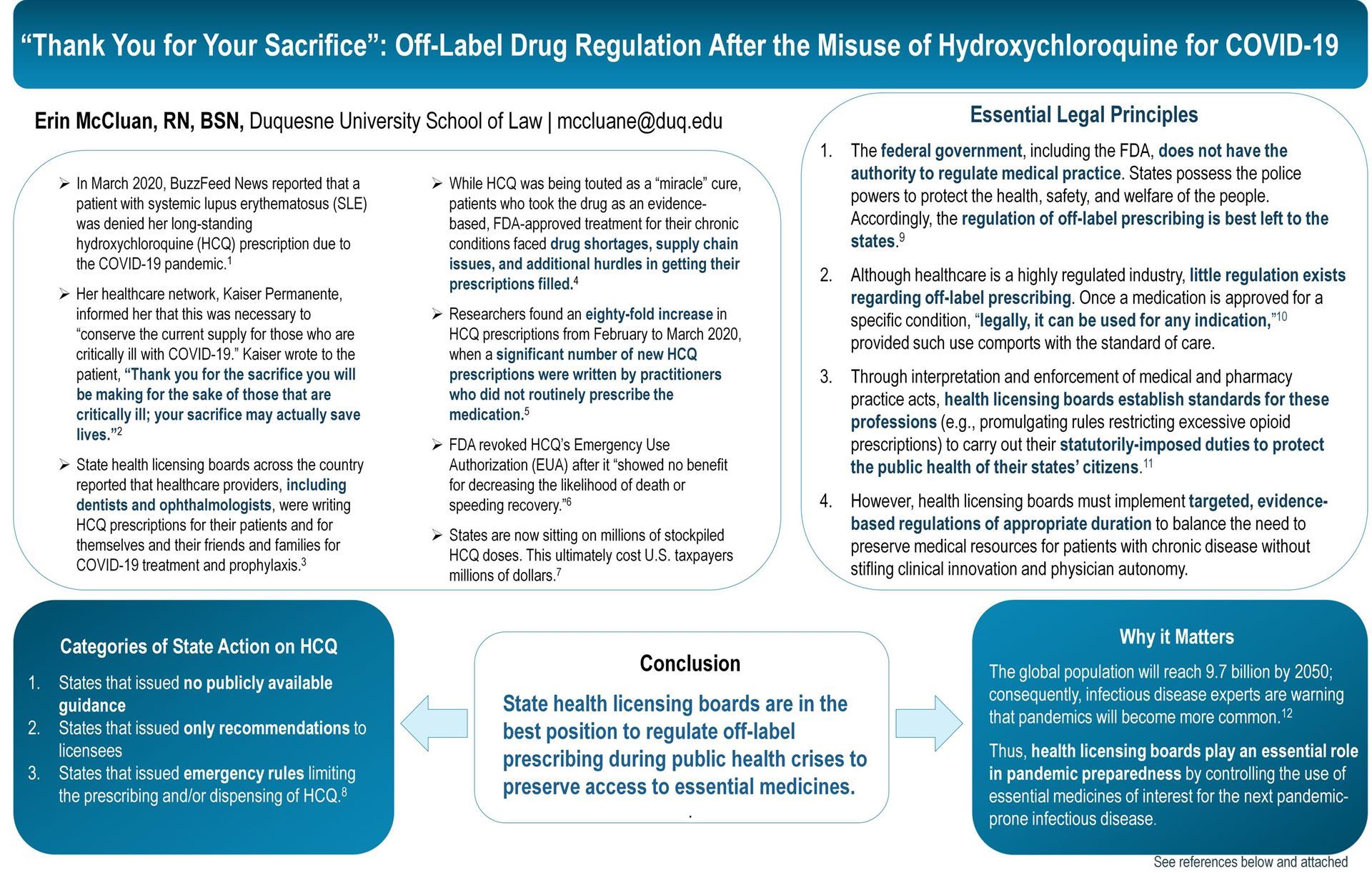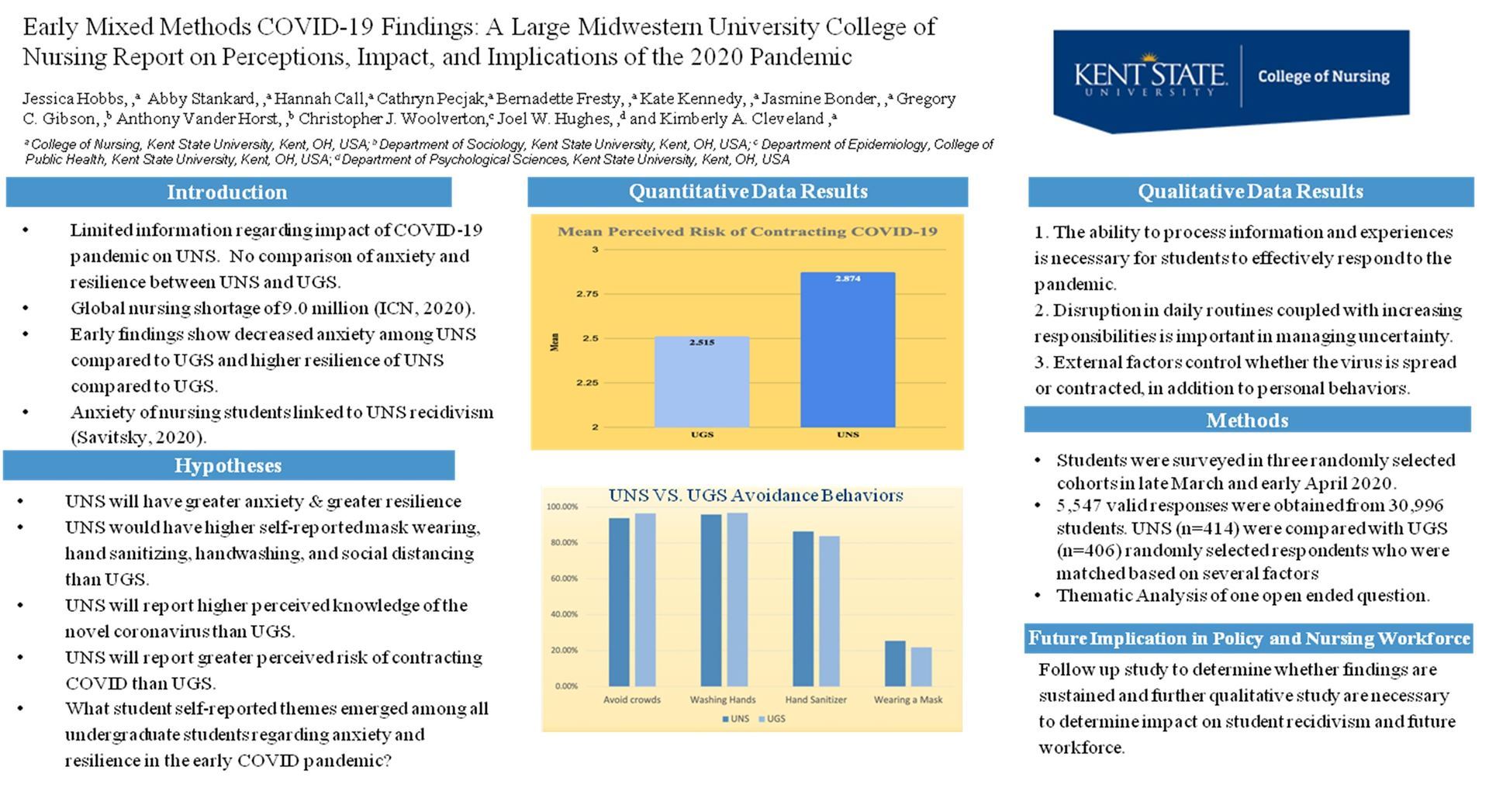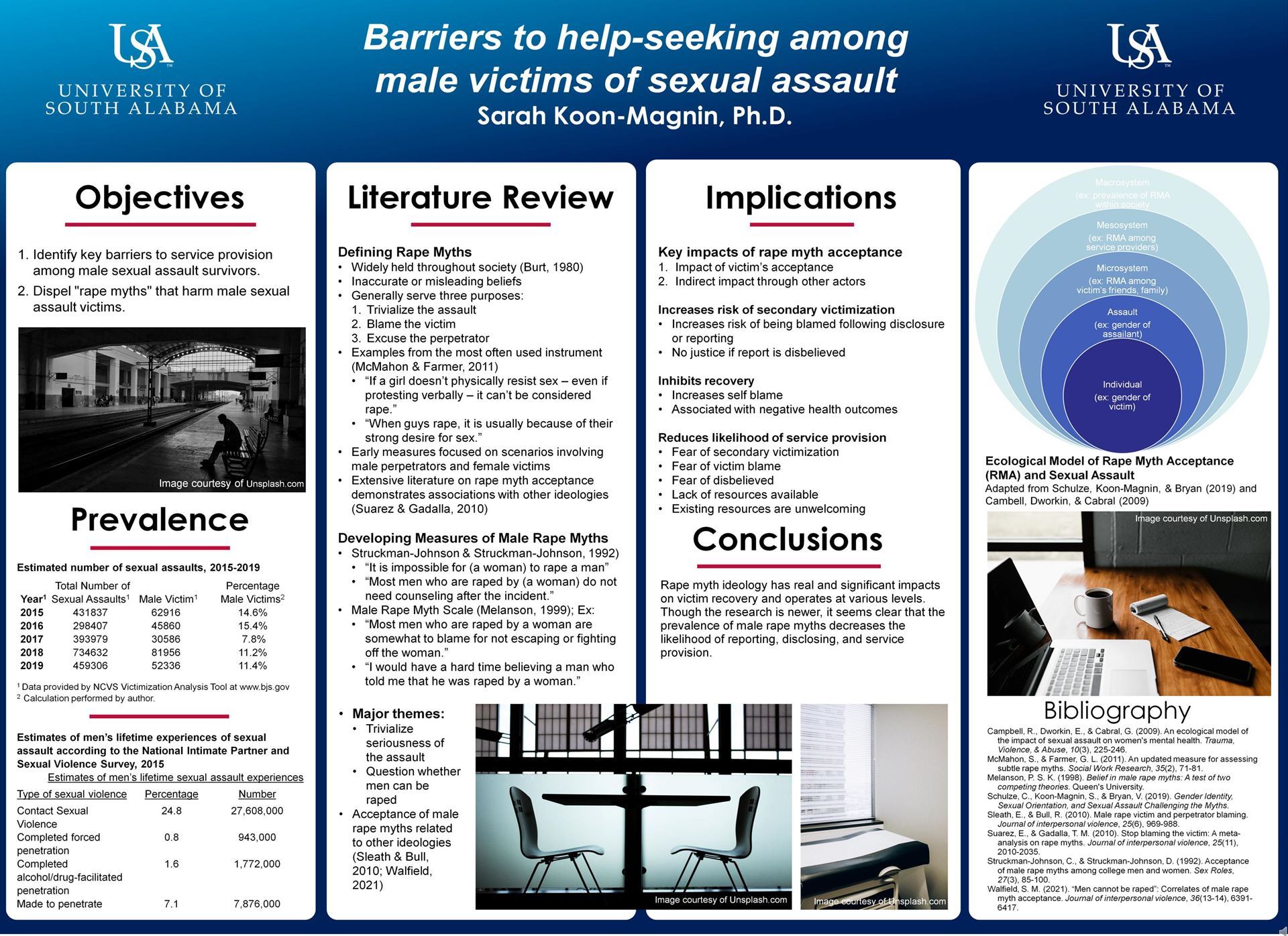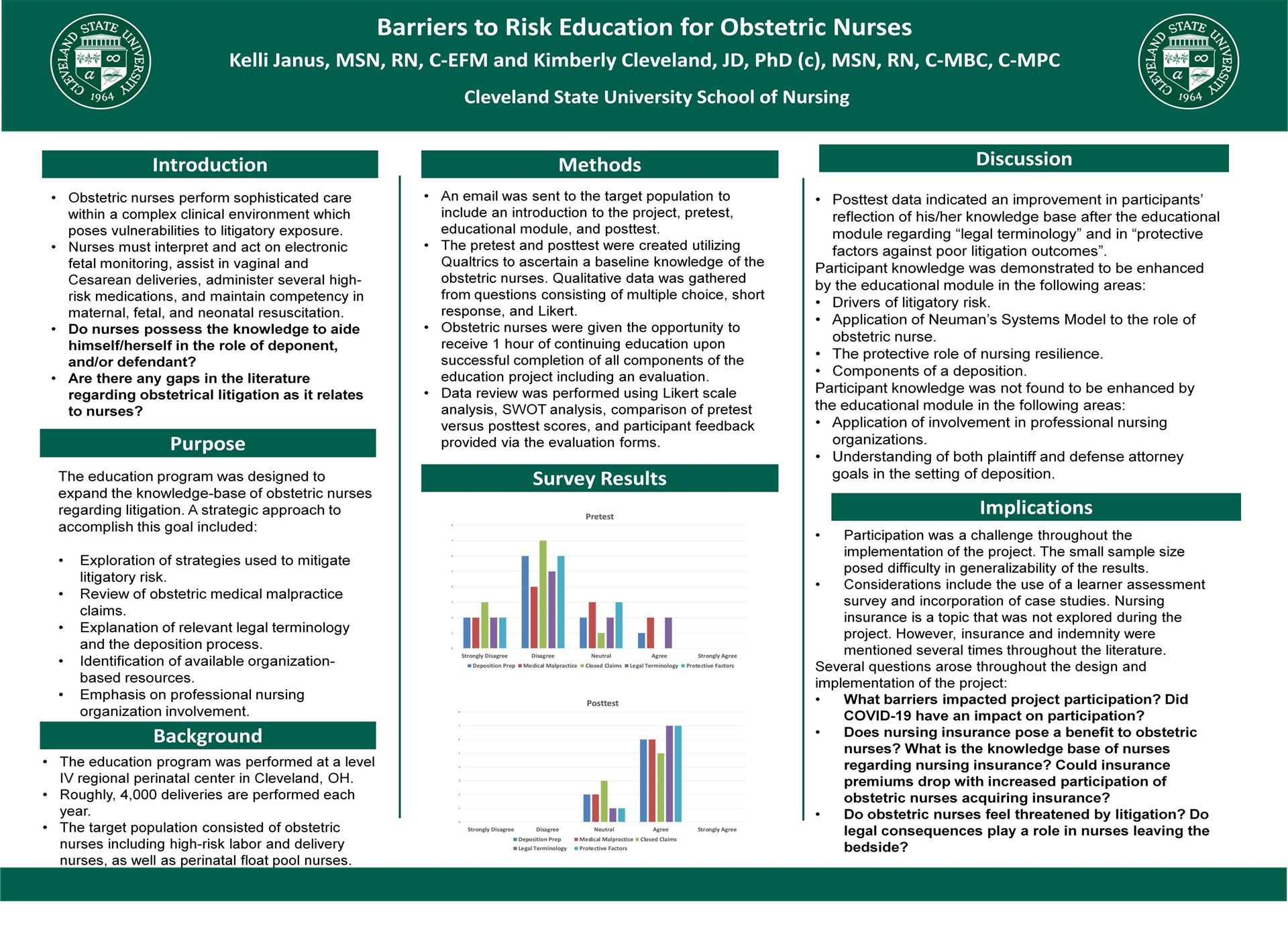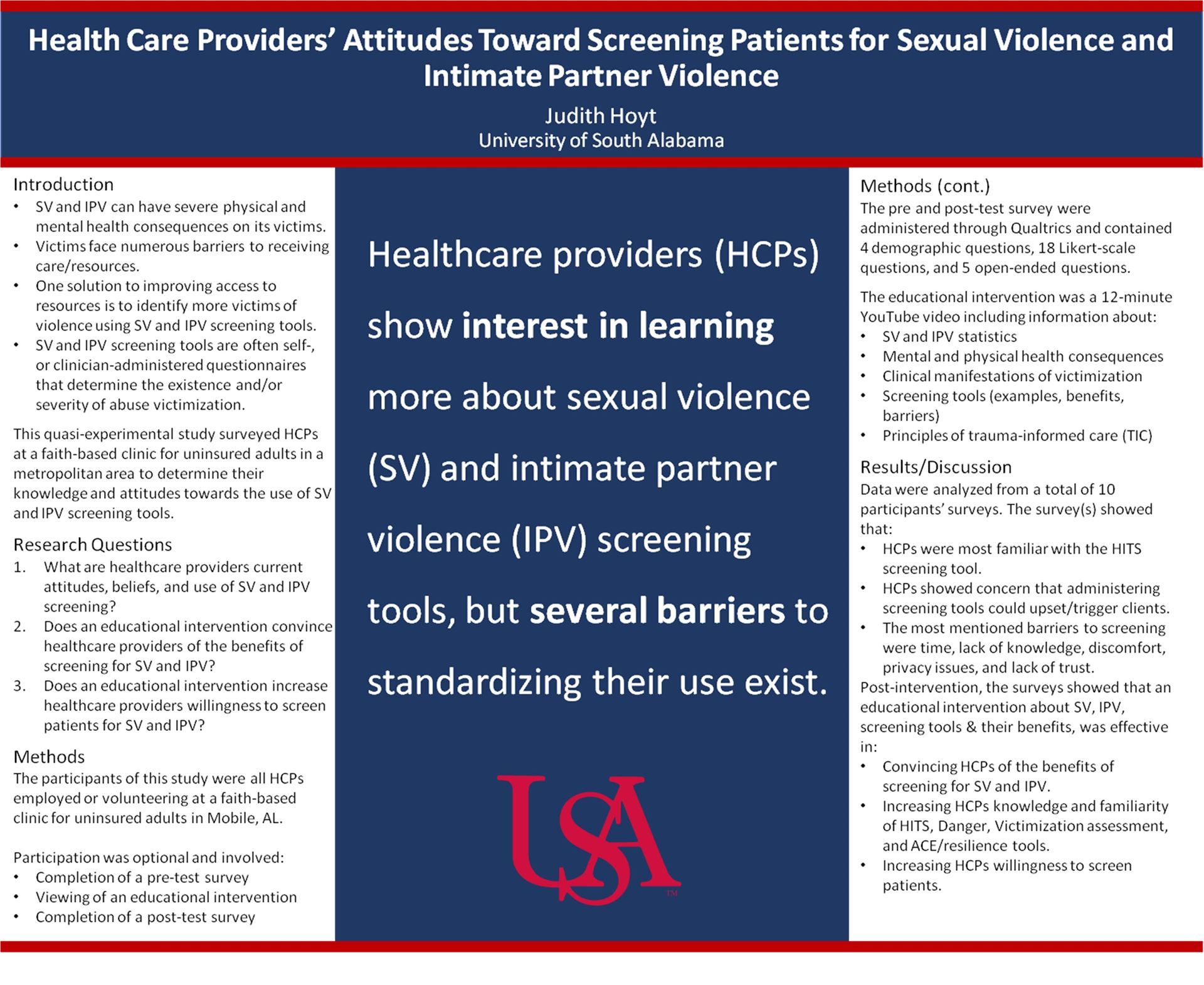Click the tabs below to view each session
Conference Sessions
Session 1. NSO Presentation on Malpractice Claims and Data
- Jennifer Flynn, CPHRM; Aon/Nurses Service Organization (NSO); Fort Washington, Pennsylvania
- Lynn Pierce, BSN, RN, CPHRM; CNA Healthcare Risk Control; Atlanta, Georgia
Learner Objectives:
- List the leading allegations made against nurses in malpractice lawsuits.
- List the leading allegations made against nurses in Board of Nursing complaints.
- Identify key risk management tools that nurses can incorporate into their practice.

Session 2. What is Telehealth Practice: Regulatory Oversight and Professional Considerations during COVID and Beyond
- Randi Kopf, RN, BS, BS, MS, JD; Kopf HealthLaw, LLC; Rockville, Maryland
Learner Objectives:
- Understand what is considered the practice telehealth prior to and during COVID.
- Identification of regulations, laws and professional codes that govern this practice.
- Awareness of professional abilities, liabilities and limits.

Session 3. Board Governance: Managing Conflicts of Interest
- Marla Weston, PhD, RN, FAAN; Weston Consulting LLC; Washington, DC
Learner Objectives:
- Describe the legal duties of a board member.
- Describe conflict of interest for a board member.
- Implement strategies to avoid or mitigate conflicts of interest.

Session 4. Evidence in Nursing Licensure Actions and Practical Solutions
- Yolonda Green, JD; Administrative Law Judge; Florida Division of Administrative Hearings; Tallahassee, Florida
Learner Objectives:
- Identify examples of valuable evidence to support presentation of a case.
- Identify Methods to preserve evidence and the record.
- Evaluate evidence offered in an evidentiary matter.
- Identify pitfalls offering certain evidence and how to overcome them.

Session 5. Scope of Practice and Ethical Issues for Nurse Practitioners
- Melanie Balestra, JD, NP, MN, BSN; Law Offices of Melanie Balestra; Rancho Mirage, California
Learner Objectives:
- Define scope of practice.
- List two scope of practice issues and resolutions.
- List two ethical issues and possible resolutions.
- List two risk management strategies for practicing within the scope of practice.

Session 6. NCSBN's Adverse Event Decision Pathway For Nurse Leaders/Administrators
- Kathleen Russell, JD, MN, RN; NCSBN; Chicago, Illinois
Learner Objectives:
- Identify nursing executives' barriers to reporting serious adverse events to a board of nursing.
- Understand the Adverse Event Decision Pathway.
- Relate the NCSBN study and how the AEDP made significant impacts on the study participants' disciplinary decisions.

Session 7. The Role of Judicial Review in Professional Discipline
- Amigo Wade, Acting Director; Virginia Division of Legislative Services; Richmond, Virginia
Learner Objectives:
- Participants will be exposed to a basic level of case law analysis as it pertains to professional licensure actions against nurses.
- Identify key legal issues facing Boards of Nursing when (i) reviewing licensing applications, (ii) imposing professional discipline, and (iii) protecting the confidentiality of patient information, and how the issues are resolved under judicial review.

Session 8. The Effect of OIG’s Exclusion Authorities on Nurses
- Nancy W. Brown, Esq; Office of Counsel to the Inspector General; U.S. Department of Health and Human Services; Washington, DC
- Felicia Heimer, Esq; Office of Counsel to the Inspector General; U.S. Department of Health and Human Services; Washington, DC
- Jonathan L. Culpepper, Esq; Office of Counsel to the Inspector General; U.S. Department of Health and Human Services; Washington, DC
Learner Objectives:
- Introduction to OIG and its' services.
- Review and discuss OIG Administrative Sanctions.
- Explore "Exclusions" its Impact.
- Review case studies and resources about Mandatory v. Permissive Exclusion.

Session 9. Unconscious/Implicit Bias and Its Impact on TAANA Members Efforts Regarding Diversity, Inclusion, Equality and Racism
- Jay B. Marks, PhD; Diversity and Equity Consultant, Oakland County Intermediate School District, Oakland County, Michigan
- Robert A. Martin, PhD; Visiting Assistant Professor, Oakland University, Rochester, Michigan
Learner Objectives:
- Define unconscious/implicit bias.
- State three elements of unconscious/implicit bias.
- Identify how unconscious/implicit bias impacts us in our interactions with others in TAANA and in our work environment.
- Identify how unconscious/implicit bias impacts others whom we interact with in TAANA and in our work environment.
- State two ways to mitigate or reduce unconscious/implicit bias in our interactions with others in TAANA and in our work environment.
**Warning - this video has poor audio quality**

Session 10a. Where Will Your Business Be Without You? Planning For Your Business Succession
- Mila Carlson, PhD, MSHSA, RN, CNLCP, CMSP-F; Success(ion) Solutions, Inc.; Rockford, Illinois
Learner Objectives:
- Define succession planning.
- Identify 5 components to address in succession planning.
- Learn how to structure a solopreneur business for succession.
- Identify ways to deal with emergent circumstances in a solopreneur business.
- Determine steps to facilitate the succession transition for retirement or sale of the business.

Session 10b. The Critical Failures in Substance Use Disorder Treatment
- Susan Ramsey, RN, JD; McLaughlin Stern; Jupiter, Florida
Learner Objectives:
- Understanding substance use disorders and its occurrence within the United States currently.
- Gain basic to intermediate understanding of the legal structure of substance abuse treatment and the standards of care applicable to substance use disorder treatment using examples of illegal and inappropriate practices.
- Learn where to find additional resources about representing Substance Abuse Treatment Centers or survivors of substandard treatment.

Session 11. Avoiding Arbitration Agreements
- Kathleen Kearney, JD, MSN, RN, CNE; Texas Tech University Health Sciences Center SON; Dallas, Texas
Learner Objectives:
- Identify typical provisions in arbitration agreements.
- Evaluate "pros" and "cons" of arbitration agreements signed by patients and nurse-employees.
- Analyze the legal and ethical ramifications of arbitration agreements signed by patients and nurse-employees.

Session 12. Creating Funnels Through Social Media to Grow Your Business, Expand Your Brand, and Create Passive Income
- Irnise Williams, JD, RN; The Law Office of Irnise F. Williams, LLC; Owings Mills, Maryland
Learner Objectives:
- Identify which form of social media is most natural for you to engage and grow your contacts and connections.
- How to create engaging content that can be shared across various medium.
- Understand how to create a funnel and guide potential clients or customers through the process.
Poster Sessions
145. Leading Change: The Use of Integrated Care to Improve Dual Diagnosis Patient Outcomes
- Claire Ellerbrock, DNP, APRN, PMHNP-BC; Kent State University; Ohio
Learner Objectives:
- Learn how providers can improve patient outcomes through care integration.
- Understand how modern healthcare necessitates the use of integration to improve outcomes and the gaps that currently exist in healthcare and patient outcomes.
- Understand how care integration creates more efficient and effective care.
- Learn how standardized care integration, if implemented universally, would create an entirely different healthcare system.
- Appreciate how care integration should be commonplace.

160. CMS Rulings Launch APP Medical Executive Membership Questions
- Amy Vaflor, DNP, CRNA, APRN; OhioHealth
Learner Objectives:
- Understand the principle of the need for governing bodies to direct policy and management issues of physicians and APRNs within healthcare systems.
- Recognize CMS regulations and IOM recommendations compliment advanced practice partnerships beyond the bedside.
- Explain that state laws determine eligibility of practitioner but does not mandate membership positions for governing bodies such as MEC.
- Learn of a healthcare provider attitudes and readiness of APRNs towards MEC membership via environmental and validation data.
- Recognize opportunity for further research with the initial survey questionnaire for APRN community.

151. "Thank You for Your Sacrifice": Off-Label Drug Regulation Strategies After the Misuse of Hydroxychloroquine for COVID-19
- Erin McCluan, RN, BSN; Duquesne University School of Law; Pennsylvania
- Understand the role of federal and state government in off-label drug regulation.
- Discuss the risks and benefits associated with off-label prescribing.
- Identify the three categories of state action on hydroxychloroquine access.
- Learn how state health licensing boards can preserve access to essential medicines.

164. Early Mixed Methods COVID-19 Findings: A Large Midwestern University College of Nursing Report on Perceptions, Impact, and Implications of the 2020 Pandemic
- Kimberly Cleveland, PhD (c), JD, MSN, RN, C-MBC, C-MPC
- Joel W. Hughes, PhD, FAACVPR; Kent State University
- Gregory Gibson, PhD; Kent State University
- Anthony Vander Horst, PhD; Kent State University
- Jasmine Hoff, MSN, RN, APRN-CNP; Kent State University
- Hannah Call, Kent State University; Undergraduate Nursing Student
- Bernadette Fresty, Kent State University; Undergraduate Nursing Student
- Jessica Hobbs, Kent State University; Undergraduate Nursing Student
- Kate Kennedy, Kent State University; Undergraduate Nursing Student
- Cathryn Pecjak, Kent State University; Undergraduate Nursing Student
- Abby Stankard, Kent State University; Undergraduate Nursing Student
Learner Objectives:
- State three themes of university student concerns related to the pandemic.
- Discuss the impact of changes in university life on student anxiety and resilience.
- Compare the response of undergraduate nursing students to the response of non-health related majors during the early pandemic period.
- Identify one practice, one regulatory and one educational implication of the early findings.

155. Barriers to help-seeking among male victims of sexual assault
- Sarah Koon-Magnin, PhD; University of South Alabama; Mobile
Learner Objectives:
- Identify key barriers to service provision among male sexual assault survivors.
- Dispel "rape myths" that harm male sexual assault victims.

163. Barriers to Risk Education for Obstetric Nurses
- Kelli Janus, MSN, RN, C-EFM; Cleveland State University, Ohio
- Kimberly Cleveland, JD, PhD (c), MSN, RN, C-MBC, C-MPC; Kent State University
Learner Objectives:
- Demonstrate understanding of the significance of litigation to the specialty of obstetric nurses.
- Gain an understanding of the effectiveness of the teaching methods utilized throughout the implementation of the educational project.
- Identify barriers to risk education for obstetric nurses.

165. Health Care Providers Attitudes Toward Screening Patients for Sexual Violence and Intimate Partner Violence
- Judith Hoyt, RN, BSN; University of South Alabama Children's and Women's Hospital; Mobile
- Carolyn Dolan, JD, MSN, FNP, PNP, SANE-A; University of South Alabama; Fairhope
Learner Objectives:
- Explore health care providers’ (HCPs) knowledge of and attitudes towards the use of sexual violence (SV) and intimate partner violence (IPV) screening tools.
|
|
Nursing Liability Coverage Workshop
1. Nurses on Boards Coalition: Leadership in Action
- Kimberly Cleveland, JD, MSN, RN, C-MBC; NOBC Chair-Elect
Presentation Objectives:
- Identify opportunities for nurses to lead in new environments across broad sectors and stakeholders.
- Identify resources nurse leaders can use to support adding board service to their CV/Resume.
- Identify resources nurse leaders can utilize to learn about board service.

2. Responding to Actions Against Nurses
- Kathleen Gialanella, Esq, RN, BSN, JD, LLM; Westfield, New Jersey
- JoAnn Pietro, RN, Esq; Verona, New Jersey

- Eileen Talamante, Esq, RN, BSN; Goodman Allen Donnelly PLLC; Richmond, Virginia

4. Licensure Defense Panel
- Cassandra Williams, LLM, JD, RN, CNOR; Warner Robins, Georgia
- Charles Hartwell, JD; Dethlefs-Pykosh Law Group, LLC; Camp Hill, Pennsylvania
- Hahnah Williams, Esq, RN; Atlanta, Georgia

5. Standards of Care; Risks of Unsafe Staffing; Safe Staffing Levels Research/Report
- Doris Carroll, BSN, RN-BC; Holiday, Florida

6. Leadership Panel
- Melanie Balestra, JD, NP, MN, BSN; Rancho Mirage, California
- Edie Brous, BSN, MS, MPH, JD, RN; East Stroudsburg, Pennsylvania
- Doris Carroll, BSN, RN-BC; Holiday, Florida
- Sara Frey, JD, BSN, RN; Washington State Nurses Association; Kingston, Washington








